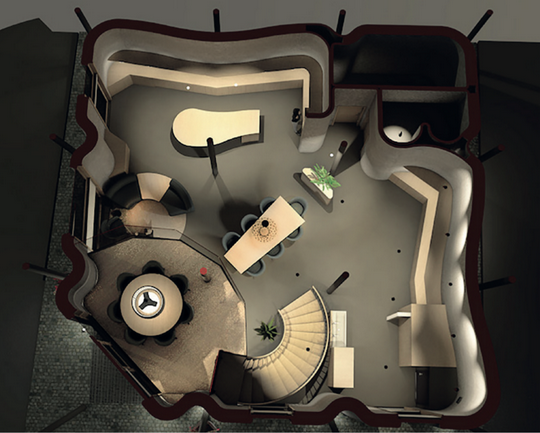 Holcim with assistance from PERI completed the printing of Switzerland’s first 3D printed building, a 150 m2 (1614 SF) showroom, in just 55 hours over 8 days.
Holcim with assistance from PERI completed the printing of Switzerland’s first 3D printed building, a 150 m2 (1614 SF) showroom, in just 55 hours over 8 days.
The 3D printed mainly curved walls, reaching 6.2 meters (20.3 feet) in height, contained 60m3 of concrete.
By using a new developed real concrete mix by Holcim, with less cement and more strength than the mortars primarily used by other printers, Holcim’s focus was both on sustainability and durability, reducing environmental impact and enhancing structural integrity of the building.
The showroom features a unique, elegant and modern design, where fan-shaped steel supports, and a wing-shaped roof, creates a striking contrast between the printed concrete and wood-steel elements.
The showroom was printed for Kobelt AG, known for its’ long-standing commitment to high-quality construction and renovation services. Based in St. Gallen, Switzerland the company has been operational since 1964 and specializes in house construction, timber construction, and building renovations.
Faced with space limitations in their present offices, Kobelt AG turned to Holcim and the innovative 3D construction printing technique to build the new showroom, aiming to explore and test the possibilities of 3D printing in construction, although Kobelt AG predominantly has been constructing in wood previously.
Recognizing the novelty of the technology, Holcim Switzerland partnered with the experienced PERI 3D Construction to assist with the project and used a BOD2 3D construction printer from COBOD, which both are minority shareholders of.
Designed as a showroom, the building covers an area of 150 m2 (1614 SF). The 3D printed walls, reaching a height of 6.2 meters (20.3 feet) were printed in just 55 hours over 8 days, demonstrating a remarkable speed that cannot be achieved with conventional methods, especially for such curved walls.
Kevin Böhlen, Project Manager at Holcim Switzerland, commented on the completion of the printing: “We printed the showroom in eight printing days with a total of 60 m³ of concrete. There were several challenges, but these learnings will help us improve our workflow for future projects. A special thanks to everyone who helped us and supported us. Also, a big thanks to Kobelt AG for their trust in us to print the first onsite building in Switzerland”.
Inside, the minimalist design combines wood with the unique concrete printed walls, and the building contain thoughtfully divided functional zones including meeting areas, sample displays, a children’s corner, a coffee kitchen, and a separate meeting room accessed by a rounded staircase. Seamless flooring and oak-look interior fittings contribute to a modern, uncluttered aesthetic.
The interior of the 3D printed showroom features an innovative design combining the raw 3D printed concrete walls with real wood creating an elegant and modern design.
The pavilion’s construction used 60 m3 of a new real concrete mix developed by Holcim instead of printing with a mortar which is the norm for non-COBOD printers.
Henrik Lund-Nielsen, Founder & General Manager of COBOD commented: “We congratulate Holcim on the development of the new 3D printable real concrete. For long we have been advocating printing with real concrete and not mortars, as the printing with mortars leads to use of more cement, higher CO2 emissions and costs. We need to lower the CO2 footprint of the construction sector, and this we can achieve by 3D printing material efficient design with real concrete, not mortars”.
www.cobod.com
































































































